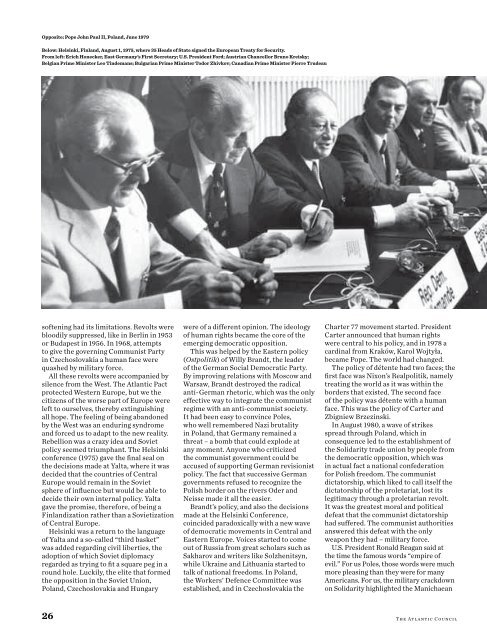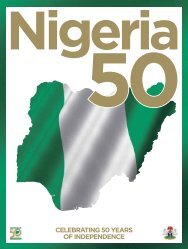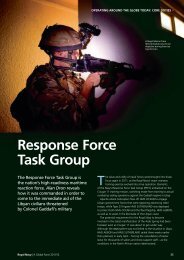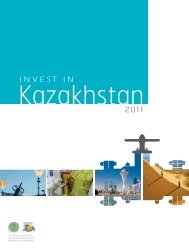NATO – A Bridge Across Time - Newsdesk Media
NATO – A Bridge Across Time - Newsdesk Media
NATO – A Bridge Across Time - Newsdesk Media
Create successful ePaper yourself
Turn your PDF publications into a flip-book with our unique Google optimized e-Paper software.
Opposite: Pope John Paul II, Poland, June 1979<br />
Below: Helsinki, Finland, August 1, 1975, where 35 Heads of State signed the European Treaty for Security.<br />
From left: Erich Honecker, East Germany’s First Secretary; U.S. President Ford; Austrian Chancellor Bruno Kreisky;<br />
Belgian Prime Minister Leo Tindemans; Bulgarian Prime Minister Todor Zhivkov; Canadian Prime Minister Pierre Trudeau<br />
softening had its limitations. Revolts were<br />
bloodily suppressed, like in Berlin in 1953<br />
or Budapest in 1956. In 1968, attempts<br />
to give the governing Communist Party<br />
in Czechoslovakia a human face were<br />
quashed by military force.<br />
All these revolts were accompanied by<br />
silence from the West. The Atlantic Pact<br />
protected Western Europe, but we the<br />
citizens of the worse part of Europe were<br />
left to ourselves, thereby extinguishing<br />
all hope. The feeling of being abandoned<br />
by the West was an enduring syndrome<br />
and forced us to adapt to the new reality.<br />
Rebellion was a crazy idea and Soviet<br />
policy seemed triumphant. The Helsinki<br />
conference (1975) gave the final seal on<br />
the decisions made at Yalta, where it was<br />
decided that the countries of Central<br />
Europe would remain in the Soviet<br />
sphere of influence but would be able to<br />
decide their own internal policy. Yalta<br />
gave the promise, therefore, of being a<br />
Finlandization rather than a Sovietization<br />
of Central Europe.<br />
Helsinki was a return to the language<br />
of Yalta and a so-called “third basket”<br />
was added regarding civil liberties, the<br />
adoption of which Soviet diplomacy<br />
regarded as trying to fit a square peg in a<br />
round hole. Luckily, the elite that formed<br />
the opposition in the Soviet Union,<br />
Poland, Czechoslovakia and Hungary<br />
were of a different opinion. The ideology<br />
of human rights became the core of the<br />
emerging democratic opposition.<br />
This was helped by the Eastern policy<br />
(Ostpolitik) of Willy Brandt, the leader<br />
of the German Social Democratic Party.<br />
By improving relations with Moscow and<br />
Warsaw, Brandt destroyed the radical<br />
anti-German rhetoric, which was the only<br />
effective way to integrate the communist<br />
regime with an anti-communist society.<br />
It had been easy to convince Poles,<br />
who well remembered Nazi brutality<br />
in Poland, that Germany remained a<br />
threat <strong>–</strong> a bomb that could explode at<br />
any moment. Anyone who criticized<br />
the communist government could be<br />
accused of supporting German revisionist<br />
policy. The fact that successive German<br />
governments refused to recognize the<br />
Polish border on the rivers Oder and<br />
Neisse made it all the easier.<br />
Brandt’s policy, and also the decisions<br />
made at the Helsinki Conference,<br />
coincided paradoxically with a new wave<br />
of democratic movements in Central and<br />
Eastern Europe. Voices started to come<br />
out of Russia from great scholars such as<br />
Sakharov and writers like Solzhenitsyn,<br />
while Ukraine and Lithuania started to<br />
talk of national freedoms. In Poland,<br />
the Workers’ Defence Committee was<br />
established, and in Czechoslovakia the<br />
Charter 77 movement started. President<br />
Carter announced that human rights<br />
were central to his policy, and in 1978 a<br />
cardinal from Kraków, Karol Wojtyła,<br />
became Pope. The world had changed.<br />
The policy of détente had two faces; the<br />
first face was Nixon’s Realpolitik, namely<br />
treating the world as it was within the<br />
borders that existed. The second face<br />
of the policy was détente with a human<br />
face. This was the policy of Carter and<br />
Zbigniew Brzezinski.<br />
In August 1980, a wave of strikes<br />
spread through Poland, which in<br />
consequence led to the establishment of<br />
the Solidarity trade union by people from<br />
the democratic opposition, which was<br />
in actual fact a national confederation<br />
for Polish freedom. The communist<br />
dictatorship, which liked to call itself the<br />
dictatorship of the proletariat, lost its<br />
legitimacy through a proletarian revolt.<br />
It was the greatest moral and political<br />
defeat that the communist dictatorship<br />
had suffered. The communist authorities<br />
answered this defeat with the only<br />
weapon they had <strong>–</strong> military force.<br />
U.S. President Ronald Reagan said at<br />
the time the famous words “empire of<br />
evil.” For us Poles, those words were much<br />
more pleasing than they were for many<br />
Americans. For us, the military crackdown<br />
on Solidarity highlighted the Manichaean<br />
26 The Atlantic Council







